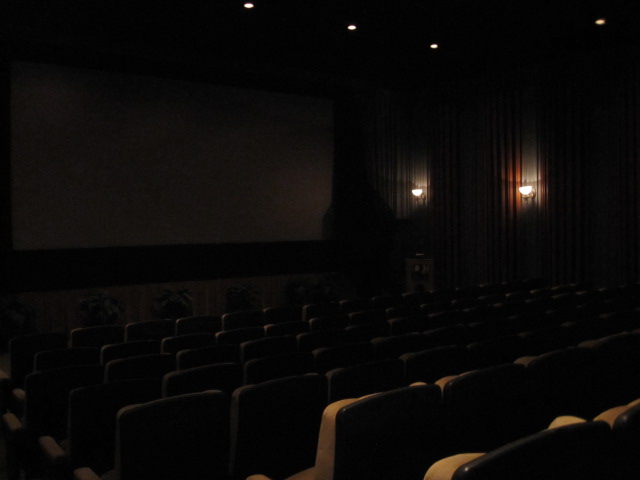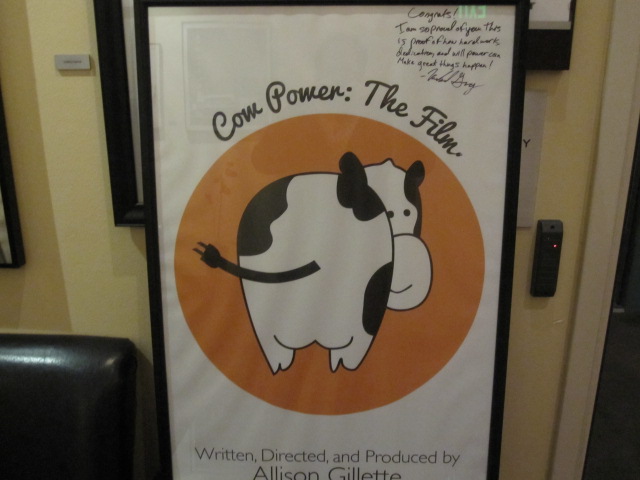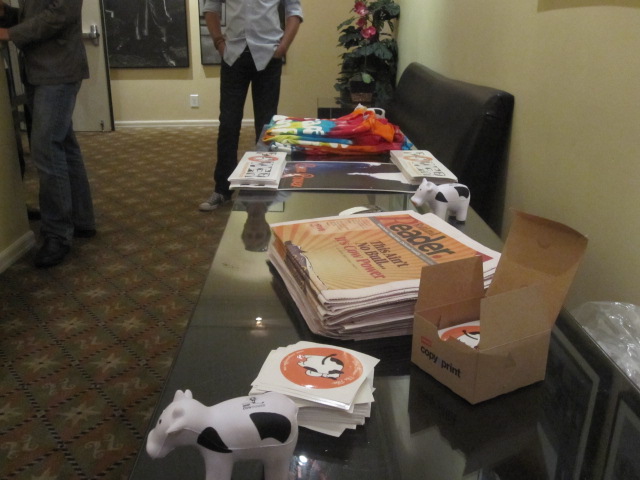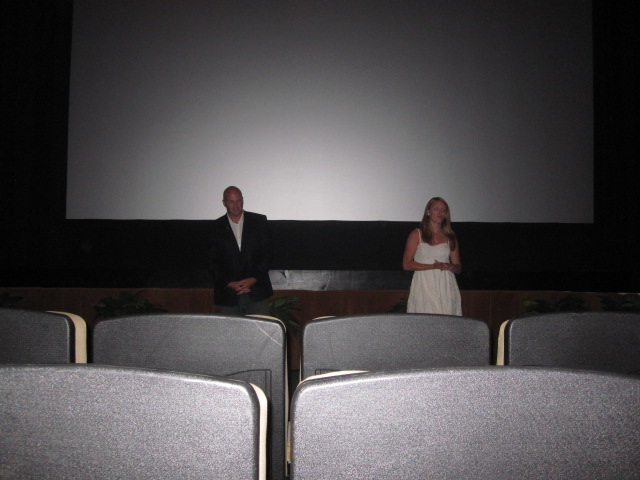‘Cow Power’ turns the lights on
By Tyler Dean
Global warming is an issue that has garnered bursts of widespread attention in both mainstream media and flyers on the walls of local colleges, with an impact as concerted as it is aloof. Films about the “inevitability” of our ill-fated demise (2012, An Inconvenient Truth) stand toe-to-toe with those rallying against the supposed absurdity of such a notion (The Great Global Warming Swindle). In a sort hilarious twist of irony, there may be a bigger issue at hand here, one that connotes the idea of a hell-on-earth as defunct. The incontrovertible truth is that, unlike the air we breathe or the waste we produce, energy—that is, the oil that produces the gas that we put in our cars, and which pumps into the atmosphere those greenhouse gases that we’re so worried about—has a finite availability. If we’re being honest with ourselves, we are running, nay, sprinting headlong into the brick wall of the stopping power that such an economic downturn would incite. But after watching Allison Gillette’s Cow Power, it’s hard to imagine how we’ve managed to entrench ourselves so deeply in quicksand ignorance and oscillating alliances of “he-said/she said.” The Emerson University graduate turns her camera not on diluted imagery of polar bears on ever-contracting stages of solid ice (nor does she posit any cyclical contentions about how terrible people are for ruining the planet), but on one of the biggest culprits of greenhouse gas emissions to date: cows.
Gillette’s film reads like an instruction manual for saving the planet. As opposed to the more narrative-driven documentaries out there (The Cove comes to mind), Cow Power is a straight shooter with little deviation toward ineffective pandering or emotive sideshow antics. Although capitalizing on viewers’ emotional investment and establishing a virtual rapport is a tactic that usually spells success for a film, Cow Power proves that a frank sit-down can be just as effective. Two reasons, and the first is easy—we’ve all heard it before. By this, I mean to say that we’re all very much aware of the problem referred to as “global warming” and “dwindling oil” at home. As with many issues lobbyists deem important and worth the country’s (in this case, the world’s) time, there simply isn’t a large enough mobilization of resources (e.g. volunteers, government intervention, corporate change) to effectively give researchers and concerned citizens the time of day to adequately shepherd fears and suspicions. Gillette focuses the film’s attention on crippling the source of all the mayhem: the ignoramus in all of us. A Documentary Filmmaking major, Gillette first got the idea for Cow Power after coming across a flyer at her school about a documentary pitch contest. With only a couple days until the competition to go, she began texting, emailing, and calling friends and family for ideas. Of these, Cow Power was one; after doing some research and stringing together the details, she pitched the idea at the competition and won. Thus began her journey of en-“light”-enment.
It goes without saying that when it comes to documentaries, it is very difficult to land in the middle of the spectrum that is “good” and “bad.” At the end of all that hard work—pre-production hell, filming, post—you either have a train wreck on your hands, or a masterpiece. The same could be said of any film, really, but a documentary inherently must take it one step further. It should teach you something; open your eyes to people, places, concepts, and knowledge that you would otherwise be oblivious to. With a deft hand and quizzical eye, Gillette pulls back the curtain on the energy crisis by focusing her lens on the small town of Bridport, Vermont, and the dairy farmers that live there. In Cow Power’s opening minutes, we’re introduced to the Audet family’s Blue Spruce Farm, host to about 1,500 cows—cows that produce milk, butter, and approximately 30 gallons of excrement (per day). Said excrement is one of the largest sources of methane gas being poured into our atmosphere, and one which up until this film has gone largely unnoticed. With 1,500 cows, that’s a lot of gas getting trapped in our atmosphere! Whereas other farmers around the U.S. have been willfully neglecting to consider the harmful effects that their industry can incite, Vermont has decided to take a stand with the help of Green Mountain Power.
A Vermont-based company, GMP’s focus is on giving residents the most reliable, affordable, smart, and clean electricity possible. One of the ways they do this is to help Vermont’s farms acquire what is referred to as a “biodigester.” Instead of inadequately storing the excrement in a container or dumping it into local water sources, farmers can transfer it into what looks to be, by all appearances, an in-ground swimming pool with a cement covering. The 16-foot biodigester can store up to 14 feet of excrement, kept at the temperature of a cow’s body, which in turn preserves the digestive state of a cow’s stomach. Using a fun animation, the film shows us that it’s during this process the methane gas will rise to the top of the containment system and be sent via pipeline to power a generator. After the methane gas has been expunged, the remaining excrement can be used to create a host of by-products: rich, odor-free manure; fibrous residue that can be used for cow-bedding; and natural heat from the methane coursing through its respective pipeline for the cold winter months. The best part is that the energy produced from a biodigester on, say, Blue Spruce Farms, is enough to power over 300-plus homes. With 75% efficiency (as opposed to wind power’s 30%, and solar’s 12%), you’re probably asking why everyone hasn’t jumped on board the Cow Power train at this point. The film tells us that the simple truth is the process can be quite expensive, for consumers, but especially for businesses. Nonetheless, we’re assured leaders like GMP’s Program Manager David Dunn will continue to champion the undeniable benefits of such technology, notably through efforts to help farmers find affordable funding.
Despite a terse 55-minute runtime, the film is as efficient as it is unassuming. Gillette has successfully rendered a heartfelt documentary with a matter-of-fact tone that bespeaks itself of a gentle maturity that one can’t help but relish. Stripping away the MTV glitz and glam of more Hollywood-ized filmmaking fare, Cow Power is a refreshingly different stand-off—instead of pointing fingers at big business or at political leaders, the viewer is put in front of a mirror and asked what they are going to do. No longer can we feign ignorance or naivety. The facts have been laid out in front of us in a painstakingly methodic fashion. I mentioned earlier that a documentary’s value is very black and white, good or bad. Cow Power is on a completely different plane. Its own scale, if you will. If I had any complaints, it would be that it leaves little room for interpretation or discourse: a film that invigorates without angering, discusses without being vulgar, postulates without overcompensating. It is its own best friend, serving the interests of multiple parties for the betterment of us all—cow power is lifted to prominent awareness (the film market), a young director to everyone’s IMDB search bars. While I have the highest hopes for the former, I have the greatest confidence in the latter.
Watch Cow Power today, available on iTunes and Vudu. You will also be able to find the film on your Netflix, Amazon, and Hulu accounts in the coming weeks. So keep an eye out.
Want to join the Cow Power Mooooo-vement? Visit the film’s website [http://cowpowerfilm.com/] and get in line to help bring cow power to your local area!














